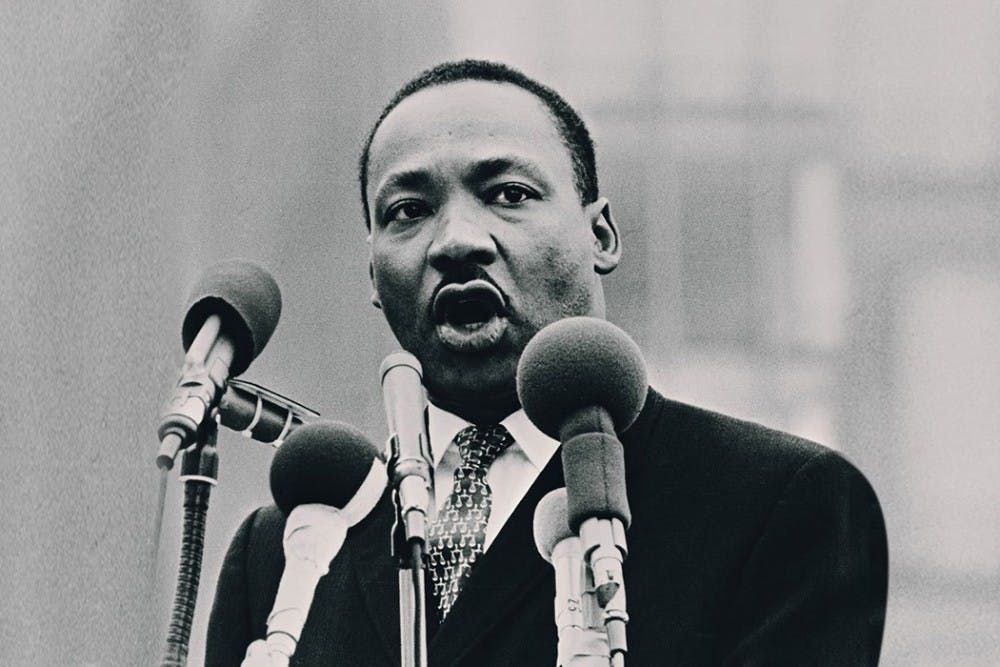Over the span of two weeks, the University and Charlottesville community are celebrating the life and legacy of Martin Luther King Jr. The celebration, which includes 20 free public events across the University and Charlottesville, began on Martin Luther King Jr. Day and will conclude Jan. 30.
This year marks the seventh anniversary of University-sanctioned events. The Office of Diversity and Equity partners with over 30 organizations to offer a diverse range of opportunities to celebrate MLK.
“This is something that’s been a large-scale effort by the University and the community as a partnership since 2011, since President Sullivan came to U.Va.,” Meghan Faulkner, assistant to the vice president and chief officer for diversity and equity for programs and projects, said. “It was one of her first directives as president that there should be a large-scale celebration of Martin Luther King Jr. at U.Va.”
This year, the theme is “silence is betrayal.” Many events center around social activism and unity. Michael Mason, assistant dean of African-American affairs, points this theme to a speech given by King in 1967 entitled, “Beyond Vietnam: A Time to Break Silence.”
“In that speech, he had begun to take a stand in reference to the Vietnam War. It was in that speech that those words were given birth,” Mason said. “A time comes when silence is betrayal. Regardless of where you stand politically, you have to take a stand and speak truth to it.”
Anita Hill will deliver the keynote address Thursday, Jan. 26 at 6:30 p.m. in the Paramount Theater. The event is sold out, with more than 1,100 seats reserved.
“I’m excited to have Anita Hill speak in Charlottesville,” Faulkner said. “I’ve heard her speak before, and I think she’ll have a lot of insights on issues of race, gender and workplace discrimination in America. She’s an expert both in civil rights and women’s rights.”
Hill is a professor of Social Policy, Law and Women's Studies at Brandeis University and made national headlines in 1991 when she made sexual harassment allegations against Supreme Court nominee Clarence Thomas during his Senate confirmation hearings.
Two events kicked off the celebration Jan. 16 when the University’s Medical Center held an interfaith service in honoring Dr. King and the Bridge Progressive Arts Initiative hosted a screening of the documentary “Freedom on My Mind.”
“[The film screening] went great. We had a full house, and it was very successful,” Lisa Jevack, operations manager of the Bridge Progressive Arts Initiative, said. “[The film] focused on the Freedom Summer, specifically the voter registration issues and struggles in Mississippi between 1961 and 1964.”
PVCC hosted their annual FAFSA completion night Jan. 17. Maurice Wallace, professor of English and associate director of African-American & African Studies, gave a speech titled “King's Vibrato: Speech, Power and the Sounds of Blackness.”
Other events included a screening of the film “Anita: Speaking Truth to Power” at Newcomb Theater Jan. 22. Covenant Church hosted an annual community celebration of Martin Luther King’s legacy on the same day.
“[The film showed] the story of Anita Hill’s rise to fame when she testified before a Senate committee in 1991 about being sexually harassed by then-U.S. Supreme Court Nominee Clarence Thomas, now Supreme Court Justice,” Faulkner said. “There [was] a reading of the winner of a local high school essay contest during [the annual community celebration].”
In the coming week, the Memorial for Enslaved Laborers will hold a public forum Jan. 23 from 6 to 8 p.m. at the Jefferson School.
Other upcoming events include a lecture by Dr. Russell Jones on human trauma and the lifelong impact for people of color, a documentary screening of “13th” and discussions with Dalia Mogahed, director of research at the Institute for Social Policy and Understanding, on Islamophobia.
The two-week event closes with a panel on the media called “#Words&ImagesMatter: Whose Words? Which Images?” Jan. 30 at 5 p.m. in the Special Collection Library. The event will be moderated by Coy Barefoot, journalist and executive producer for the Center for Media and Citizenship.
Throughout the different events and lectures, all those involved hope to honor Dr. Martin Luther King Jr. and engage the community in discussion and out of silence.
“We have to continue to think about the experience of the other and to reaffirm our commitment to do work that is primarily and necessarily multiracial, interracial and intercultural in its nature,” Mason said. “When we start to think about the work we have to do, this gives us an idea of the scope of the work. His text allows us to think in very complex ways about our responsibility to humanity.”







